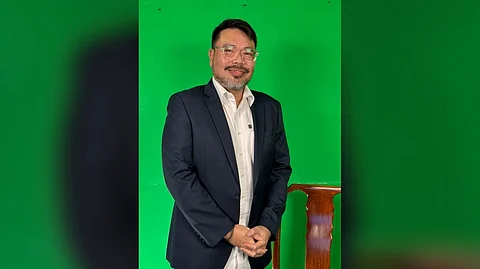
- NEWS
- the EDIT
- COMMENTARY
- BUSINESS
- LIFE
- SHOW
- ACTION
- GLOBAL GOALS
- SNAPS
- DYARYO TIRADA
- MORE

The economy, which grew 5.4 percent in the second quarter, at the low end of the government target, has not been hitting its potential, SM Investments Corp. economist Robert Dan J. Roces said.
In an interview in DAILY TRIBUNE’s online program Straight Talk, Roces, who advises the SM Group at the Office of the Chairman level, said, “The economy is still growing, although not as fast as we’d like.”
“That’s mostly because of external factors, however, such as trade wars, geopolitical events, global slowdowns — rather than internal weaknesses,” he explained in an exclusive interview with DAILY TRIBUNE.
Roces’ interpretation of President Ferdinand Marcos Jr.’s recent State of the Nation Address (SoNA) reflected his philosophy. The President’s silence on sweeping new economic reforms, Roces said, “was “telling — telling in the sense of ‘why fix something that’s not broken?’”
Looking at the data, Roces argued that while the economy is not expanding at the pace policymakers might desire, it remains on solid footing.
“We’ve been on a growth path since before this administration, slowed by the pandemic lockdowns, but still in positive territory.”
One recurring theme in Roces’ commentary is the imbalance between the country’s import dependence and its relatively underdeveloped export sector. With private consumption making up about 70 percent of GDP, the Philippines is heavily reliant on imports to meet domestic demand.
This, he said, shapes his perspective on tariff policies. “For the 19 percent tariff rate, I’d say it’s not unfair, considering we are not an export-heavy economy geared toward the US market,” Roces said.
“Our exports to the US are not that large relative to GDP. We don’t produce in the volume that China does, so the impact is limited. But that also shows the opportunity — to grow our export sector and diversify our trade partnerships.”
Foundation for growth
For Roces, addressing this challenge requires more than just increasing production — it calls for a strategic recalibration of the country’s economic direction.
“It’s a call to look inward, assess why we’re not growing exponentially in exports, and see how we can reposition ourselves to serve more markets,” he said.
That recalibration, Roces believes, begins with infrastructure — the foundation that makes investment viable and trade more efficient.
“Investors respond to infrastructure. If they see an efficient port system, reliable transport, and smooth logistics, they know delays won’t be an issue,” he said.
He points to Thailand’s strong logistics network and China’s rapid development as benchmarks. “Sadly, we let some of our infrastructure edge slip away. In Manila, you see trucks jostling with private cars en route to the port — that’s a logistics bottleneck right there,” he noted.
To reverse this, he advocates for modernized ports, dedicated freight corridors, and railway systems that connect manufacturing hubs to shipping points. “Seafaring remains the best avenue for goods transport, and with our archipelagic geography, we should be a leader in this space,” Roces added.
Part of the problem, he recalls, stems from the 1990s, when many manufacturers relocated to China for lower costs and better logistics. Unlike India, which retained satellite manufacturing hubs, the Philippines lost much of its base.
“The shift in strategy should have been toward attracting sunrise industries while simultaneously regaining lost sectors,” he said.
Today, with some companies considering moving operations out of China to avoid US tariff costs, Roces sees a timely opening. “We need to position ourselves as an attractive alternative,” he stressed.
“Our location in the heart of Asia is strategic. We just have to match it with the right infrastructure and policies.”
Shine a light on education
While trade and infrastructure are immediate priorities, Roces also underscores the long-term need to strengthen the education sector. He supports the Department of Education’s integration of artificial intelligence into the curriculum, calling it “a progressive step to prepare the future workforce.” Even with debt servicing consuming a large share of the national budget, he considers increased education funding a positive development.
His interest in education ties into another advocacy: fiscal literacy. “People should know how the national budget works,” he said. “If you’re going to be critical, base it on an understanding of the numbers, not on hearsay.”
He clarified that so-called “budget insertions” are reallocations within a fixed budget — contentious only when funds are shifted away from urgent priorities such as education toward less essential areas.
Beyond macroeconomics, Roces draws on his banking background to highlight the country’s low savings rate and limited use of investment vehicles. He encourages exploring instruments like bonds, which offer a middle ground between low-yield savings accounts and volatile stocks.
“Investing is akin to saving, but with better returns. The key is understanding the instruments you choose,” he said. He also supports digitalizing savings, likening it to bringing the traditional alkansya into the online space.
For Roces, sustained economic health depends on a virtuous cycle where investment creates jobs, jobs boost incomes, and increased spending fuels production. “If we attract more foreign direct investments, we create jobs, incomes rise, spending increases, and production expands. That’s the circular economy,” he explained. Higher consumption, he added, could eventually ease the individual tax burden as government revenue from value-added and corporate taxes rises.
Looking ahead, Roces cautions that the Philippines must remain alert to opportunities emerging from the “new world order” in trade. “Manufacturing relocation and expanded trade relations are the near-term priorities. Internally, we’re in good shape, but we need to bring in industries that will set up shop here,” he said.
It’s a perspective that blends caution with optimism — rooted in data but attuned to the possibilities of a shifting global economy. For Robert Dan Roces, the task is not to reinvent the wheel, but to keep it turning — faster, more efficiently, and in the right direction.
